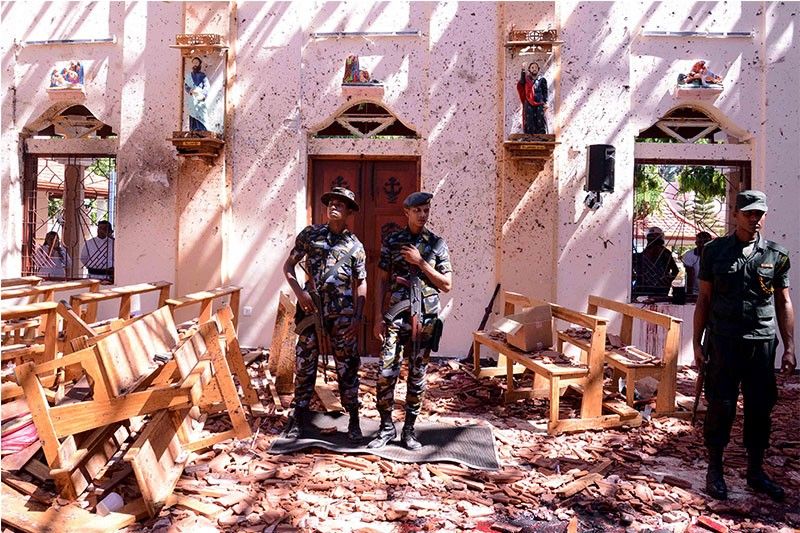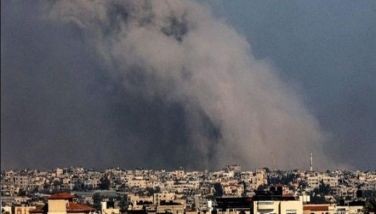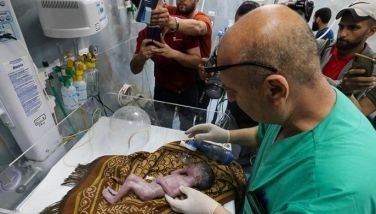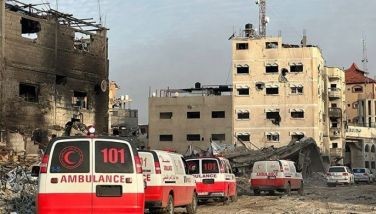Easter blasts at Sri Lanka hotels and churches kill at least 207

COLOMBO, Sri Lanka — A series of eight devastating bomb blasts ripped through high-end hotels and churches holding Easter services in Sri Lanka on Sunday, killing at least 207 people, including dozens of foreigners.
The apparently coordinated attacks were the deadliest to hit the country in the decade since the end of a bloody civil war that killed up to 100,000 people and evoked painful memories for many Sri Lankans.
They also marked a devastating escalation of violence against the country's Christian minority that has been targeted in the past, but never to such brutal effect.
There was no immediate claim of responsibility, but the government said eight people had been arrested and investigators would look into whether the attackers had "overseas links".
The government also imposed a nationwide curfew and curbed social media access to prevent "wrong information" from spreading in the country of 21 million people.
The powerful blasts -– six in quick succession and then two more hours later -- injured hundreds.
At least two of them involved suicide bombers, including one who lined up at a hotel breakfast buffet before unleashing carnage.
By late Sunday, the toll stood at 207 dead and 450 people injured.
Police said 35 foreigners were among the dead, including American, British, Chinese, Dutch and Portuguese citizens.
New Delhi said three Indians were killed, while Washington and London also confirmed an unspecified number of their nationals were among the dead.
Among the churches targeted was the historic St Anthony's Shrine, a Catholic church in Colombo, where the blast blew out much of the roof.
Bodies lay on the ground of the church, covered in patterned scarves and white sheets, some of them stained with blood.
Shattered roof tiles and shards of glass littered the floor, along with chunks of plaster blasted from the walls by the explosion.
'A lot of fear'
Documents seen by AFP show that Sri Lanka's police chief Pujuth Jayasundara issued an intelligence alert to top officers 10 days ago, warning that suicide bombers planned to hit "prominent churches".
"A foreign intelligence agency has reported that the NTJ (National Thowheeth Jama'ath) is planning to carry out suicide attacks targeting prominent churches as well as the Indian high commission in Colombo," the alert said.
The NTJ is a radical Muslim group in Sri Lanka that was linked last year to the vandalisation of Buddhist statues.
Prime Minister Ranil Wickremesinghe acknowledged that "information was there" about possible attacks and that an investigation would look into "why adequate precautions were not taken".
Ethnic and religious violence has plagued Sri Lanka for decades, with a 37-year conflict with Tamil rebels followed by an upswing in recent years in clashes between the Buddhist majority and Muslims.
Catholics make up around six percent of the island nation's population, which is a patchwork of different religious and ethnic groups dominated by Buddhist Sinhalese.
While there have been attacks on Christians, their community had been left relatively unscathed until now.
Rucki Fernando, a Christian Sri Lankan, told AFP: "We haven't experienced anything like this in the last 10 years."
"There is a lot of fear, not just in the Christian community, but among everyone," he added.
'River of blood'
Sri Lanka's Minister of Economic Reforms, Harsha de Silva, described "horrible scenes" at St Anthony's church.
"I saw many body parts strewn all over," he tweeted.
Witness N. A. Sumanapala was near the church when the blast happened.
"I ran inside to help. The priest came out and he was covered in blood," he told AFP. "It was a river of blood."
A second blast hit St Sebastian's Church in Negombo, north of the capital during Easter Mass.
Gabriel, who declined to give his family name, said his brother was injured in the explosion, adding: "We don't want the country to go back to that dark past where we had to live in fear of suicide blasts all the time."
Soon after the first two church blasts, police confirmed that the Zion church in the east coast town of Batticaloa had been hit, along with three high-end hotels in the capital -- the Cinnamon Grand, the Shangri-La and the Kingsbury.
A manager at the Cinnamon Grand, near the prime minister's official residence in Colombo, said a suicide bomber blew himself up at the hotel's restaurant.
"He came up to the top of the queue and set off the blast," the manager said.
Later in the afternoon, two people died in a strike at a hotel in the south of Colombo, and a suicide bomber killed three police officers as they raided a house in a northern suburb of the city.
'Horrible' attacks
Wickremesinghe urged people to "hold our unity as Sri Lankans" and pledged to "wipe out this menace once and for all".
The archbishop of Colombo, Malcolm Ranjith, described the attackers as "animals" and called on authorities to "punish them mercilessly".
US President Donald Trump tweeted his condolences about the "horrible terrorist attacks", and Pope Francis in his Easter address at the Vatican spoke of his "affectionate closeness with the Christian community, attacked while it was at prayer".
Embassies in the capital warned their citizens to stay inside, while there were chaotic scenes at Colombo airport as worried travellers who had just arrived in the country formed huge lines at the only taxi counter that was open, and watched a TV screen for updates.
Pietro Gunesekera, who works for The Kingsbury, said guests who had bookings there were being taken to other hotels while a worker manning the Cinnamon Grand's desk at airport arrivals said several foreign tourists had opted not to stay because of the attacks.
There have been no attacks in Sri Lanka linked to foreign Islamist groups, but in January, Sri Lankan police seized a haul of explosives and detonators following the arrest of four men from a newly formed radical group.
Pope Francis stands with victims of 'such cruel violence' in Sri Lanka.
A series of eight devastating bomb blasts ripped through high-end hotels and churches holding Easter services in Sri Lanka on Sunday, killing nearly 160 people, including dozens of foreigners.
Father Suranga Warnakulasuriya says prayers alone in his church Sunday, as Catholic services were suspended across Sri Lanka for the second straight week since the Easter suicide attacks.
With the army staging raids across the country and authorities maintaining high levels of security, the country's 1.25 million Christians are still on edge after jihadist bombers killed 257 people.
Warnakulasuriya has been saying mass in an empty church in Negombo, just north of the capital, every day since the slaughter at three hotels and three churches, one not far from his.
"Sometimes we feel lonely by not being able to celebrate the mass together," admits the fresh-faced 32-year-old who only became a priest in 2015. -- Agence France-Presse
The Islamic State group claims a series of bombings that killed more than 320 people in Sri Lanka.
"Those that carried out the attack that targeted members of the US-led coalition and Christians in Sri Lanka the day before yesterday are Islamic State group fighters," says a statement released by IS propaganda agency Amaq. — AFP
Sri Lanka falls silent for three minutes on a day of national mourning to honour more than 300 people killed in suicide bomb blasts that have been blamed on a local Islamist group.
Flags were lowered to half mast on government buildings, and people bowed their heads and reflected silently on the violence that has caused international outrage. — AFP
An improvised pipe bomb discovered close to Colombo's main airport was successfully diffused by the Sri Lanka airforce, police said.
A police source told AFP that a "homemade" pipe bomb had been found late Sunday on a road leading towards the main terminal, which remains open with heavy security after deadly attacks on churchs and hotels.
Airforce spokesperson Group Captain Gihan Seneviratne said the IED was believed to be locally manufactured. — AFP
- Latest
- Trending
































